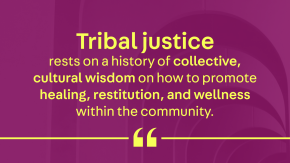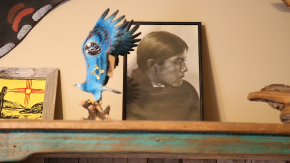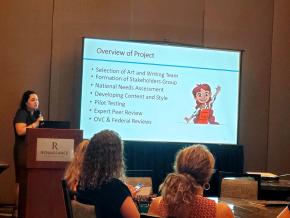
A Q&A with our Tribal Justice Exchange team on respecting tribal sovereignty, the cultural wisdom behind tribal justice, and what they're doing to uplift Native youth.
What is the Tribal Justice Exchange?
The Tribal Justice Exchange provides support to tribal communities that are seeking to strengthen their justice system responses. Our team respects the inherent sovereignty of each tribal nation and recognizes that it is an honor to be invited to work with each tribe. In the more than 60 tribes we’ve worked with across the country, we offer guidance to help find innovative solutions to the public safety challenges that many Native communities face, while incorporating the specific traditions and values of each tribe.

Where does tribal sovereignty fit into the work of building justice and safety in Native communities?
Tribal nations are unique sovereign governments that deeply value their traditions, customs, and community. Tribal approaches to justice are filled with cultural wisdom and traditions that predate the formation of the United States. Tribal justice isn’t new or young like the American justice system: it’s something that has always existed within tribal nations. Even though tribes face a new set of challenges in administering justice today, tribal justice rests on a history of collective, cultural wisdom on how to promote healing, restitution, and wellness within their communities.
What are some of the main challenges you find that tribal justice systems and communities are seeking help with?
Tribal justice systems face a number of challenges when it comes to advancing justice in their communities. For example, the United States Congress and Supreme Court have shaped the US’s relationship with tribal nations over the years in ways that have affected tribal jurisdiction. This has often led to ambiguities as to who has jurisdiction, as well as overlaps. It can also create gaps in how jurisdictions respond to crime or provide other vital services to tribal members. Tribes around the country have found many creative ways to fill these gaps, from developing community-based responses to advocating for systemic change. At the Tribal Justice Exchange, one of our roles is sharing out those solutions so that tribal justice systems can learn from each other’s efforts to advance justice and safety in their communities.

Alisha Morrison of our Tribal Justice team gives a presentation on our Native Child Witness Materials project in Palm Springs, CA.
What does that work look like in practice?
In all of our work, we’re helping tribal nations shape solutions for their justice systems around the specific needs and values of their communities. Over the past five years, our team has been working on an assessment tool to help tribal judges balance the needs of people who come into the system against concerns around community safety in order to make fairer, more informed decisions. Unlike the tools that are already out there—which weren’t built for Native people—the one we’re piloting is specifically tailored to tribal communities. We’re looking forward to sharing this resource out widely once it’s been finalized.
We’ve also had the pleasure of running tribaljustice.org, a tremendous resource for practitioners in tribal justice systems and beyond. The website is a place for practitioners to share their experiences and explore what other tribes are doing to address crime, protect victims, and improve public health and safety for their tribal members. It also includes detailed profiles of tribal justice programs around the country, recorded interviews, videos, a discussion forum, and more.
How did the Tribal Justice Exchange get started?
The seeds of the Tribal Justice Exchange were planted over 15 years ago, when two members of the Center for Justice Innovation’s technical assistance team were giving a presentation about community courts at a conference on criminal justice reform. While listening to the presentation, a tribal judge in the audience noticed that the community court approach—which looks for restorative solutions to the problems that bring people into court—shared many of the same goals as tribal justice systems. The judge approached the Center team with a suggestion: why not share our expertise on community courts with tribal justice audiences?
Not long after that, our team received a grant to help tribal justice systems strengthen problem-solving approaches in their courts. The Tribal Justice Exchange has always been a collaboration and learning exchange with tribal nations. That exchange goes both ways. Our team shares information about promising practices happening in other jurisdictions, while also learning about the unique approaches to justice that tribal nations use to encourage healing and repair in their communities.
What is the Tribal Justice Exchange doing to empower Native youth?
We’ve recently started working with Dee Mandiyan, Senior Program Manager of the Youth Action Institute here at the Center, and the Institute of Indigenous American Legacy (I. Am. Legacy.) to design a tribal youth leadership program that will be launching in early 2024. This exciting new project will bring a cohort of 8 to 10 tribal teens together from across the country to collaborate on innovative strategies to address current issues facing Native youth. The program’s goal is to train and support tribal youth to strengthen their voices, decision-making, and agency with guidance from leaders in their own community.

